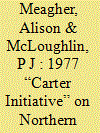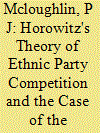| Srl | Item |
| 1 |
ID:
167839


|
|
|
|
|
| Summary/Abstract |
Scholars have extensively documented the vital role of the Clinton administration in the early stages of the Northern Ireland peace process.1 However, Clinton’s intervention in Northern Ireland was not the first by a U.S. president. That came two decades earlier, with the Carter administration. Carter’s brief foray into Northern Ireland politics was obviously more limited than Clinton’s lengthy engagement, and is also less celebrated. This is understandable given the direct role that Clinton, and more particularly his envoy to Northern Ireland, Senator George Mitchell, played in brokering the 1998 Good Friday Agreement (GFA), which underpins the peaceful settlement that the region still enjoys today. But in some ways Carter’s role can be seen as more significant than, or certainly foundational to, Clinton’s efforts. Carter’s intervention came during the Cold War, which had an indirect effect on Northern Ireland.2 Despite significant agitation from Irish America, successive U.S. administrations refused to comment on Northern Ireland, deeming it a purely internal affair—and often a matter of considerable international embarrassment—of the British government, Washington’s key ally in a Cold War context.
|
|
|
|
|
|
|
|
|
|
|
|
|
|
|
|
| 2 |
ID:
084253


|
|
|
|
|
| Publication |
2008.
|
| Summary/Abstract |
Donald Horowitz's theory of ethnic conflict suggests that a political party operating in a deeply divided society can be effected by a centrifugal pull even when it is not subject to formal electoral competition. This idea can be applied to Northern Ireland's SDLP in the 1970s, when the party faced no credible electoral rival within its primary political constituency. Doing so helps to explain why the SDLP failed in its original objective of mobilizing a cross-community constituency, and instead became what Horowitz terms an "ethnically based party," representing the interests of only one side of the political divide in Northern Ireland.
|
|
|
|
|
|
|
|
|
|
|
|
|
|
|
|